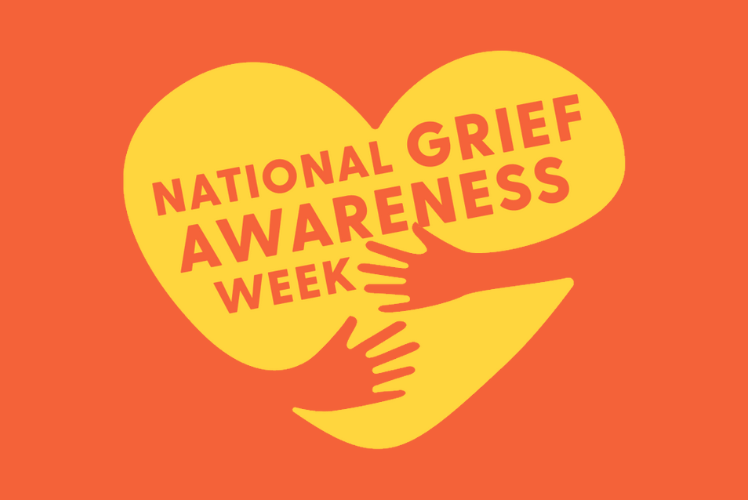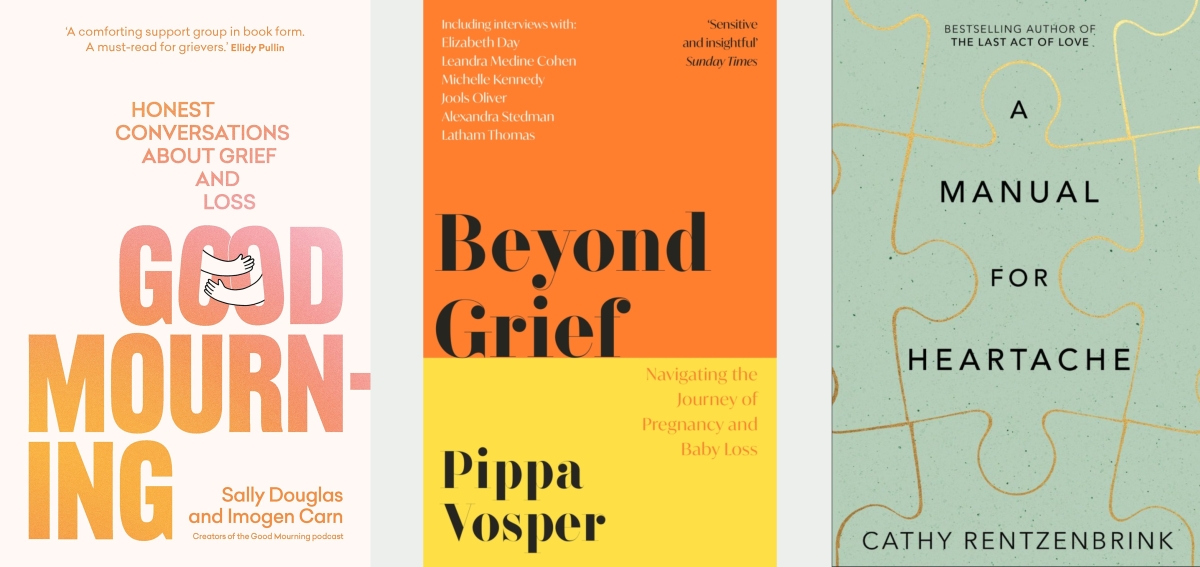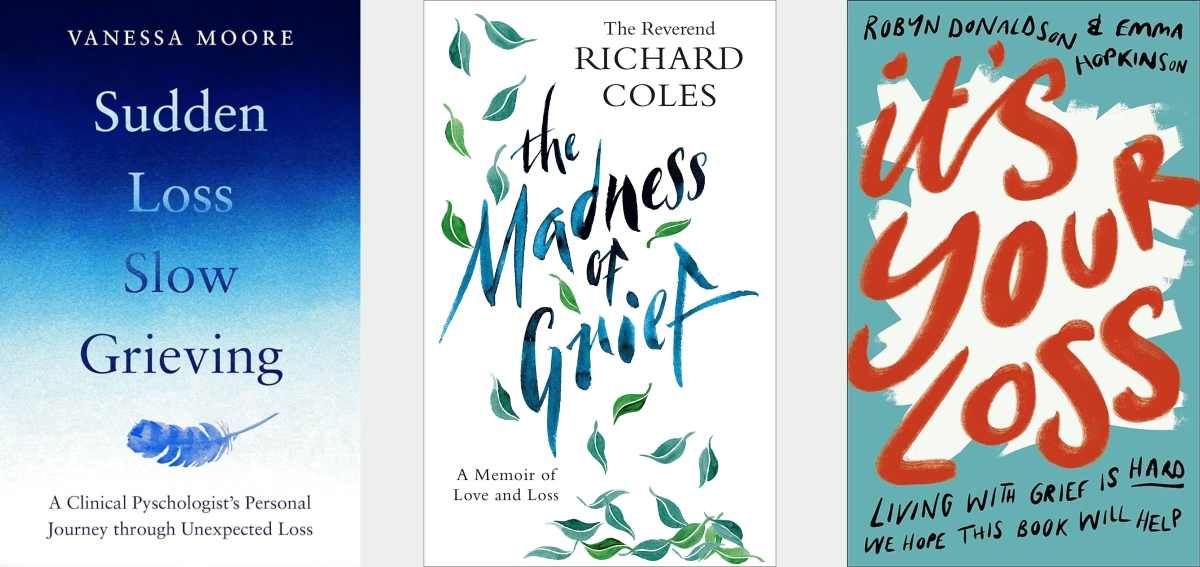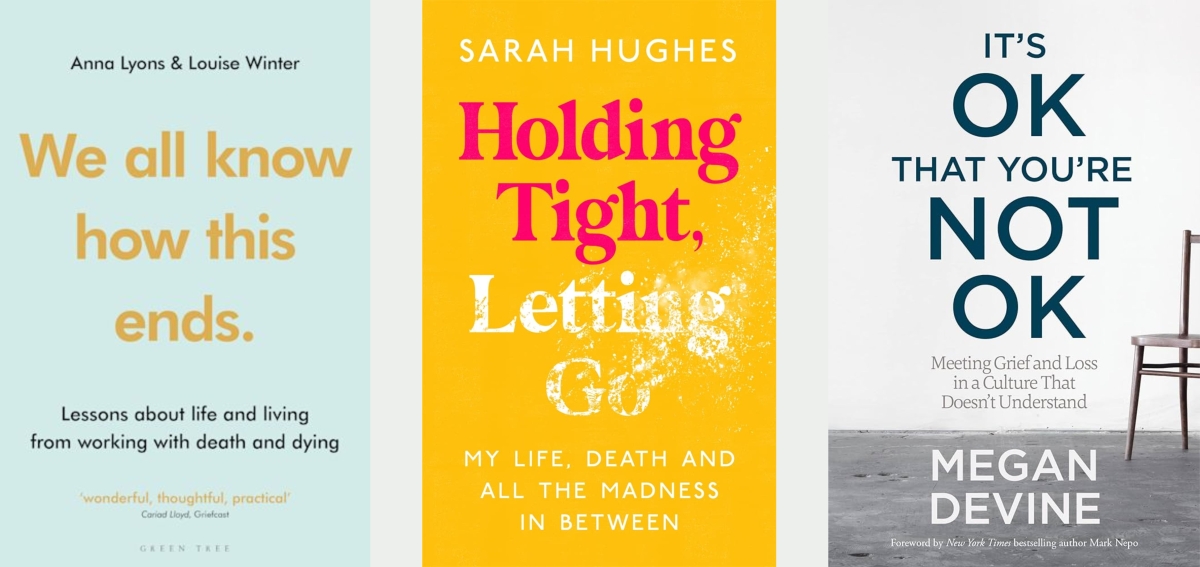
National Grief Awareness Week is dedicated to raising awareness about grief and providing support to those who are grieving. The Good Grief Trust provides a wide range of helpful information to foster a better understanding of the grieving process, including interviews and webinars.
Reading can offer comfort, solace, and advice when we need it most. This list highlights 15 books that help start supportive conversations about death, dying and loss. Click on the titles to reserve them from the Library today.
For more information and local resources, including books for children, visit our webpage here.
-----------------------------------------------------------
1. Good Mourning: Honest Conversations About Grief and Loss / Imogen Carn, Sally Douglas
Sally Douglas and Imogen Carn met after the sudden deaths of their mothers only months apart. Their experiences led them to launch a podcast, and their no-holds-barred, relatable approach to talking about grief sparked a growing following of people eager to have honest conversations about what it really feels like to deal with loss.
Good Mourning is a compassionate survival guide for anyone dealing with grief - the kind of book Sal and Im wish they'd had to help them through the dark times. Here they shine a light on the many ways grief can impact our lives (hello ugly crying, exhaustion and 'grief brain'). Along with expert advice from clinical psychologist Tamara Cavenett and warm words and insights from hundreds of others who've experienced grief, the authors offer practical tips on coping with isolation and loneliness, navigating grief at work, managing milestones and so much more.
2. Let's Talk About Death (Over Dinner) / Michael Hebb
Of the many critical conversations we will all have throughout our lifetime, few are as important as the ones discussing death - and not just the practical considerations, such as DNRs and wills, but what we fear, what we hope, and how we want to be remembered. Yet few of these conversations are actually happening.
Inspired by his experience with his own father and countless stories from others who regret not having these conversations, Michael Hebb cofounded Death Over Dinner - an organization that encourages people to pull up a chair, break bread, and really talk about the one thing we all have in common. Death Over Dinner has been one of the most effective end-of-life awareness campaigns to date; in just three years, it has provided the framework and inspiration for more than a hundred thousand dinners focused on having these end-of-life conversations
3. Tell Me Good Things: On Love, Death and Marriage / James Runcie
James Runcie's wife Marilyn Imrie died in August 2020. Their thirty-five year marriage had been miraculously happy - until, in the last two years of Marilyn's life, she descended into the pain and humiliation of motor neurone disease. In the wake of her death, Runcie stumbled in the dark. How do you make sense of the decline and death of the most alive person you have ever met? And how do you go about building a life worth living in their absence?
In Tell Me Good Things, Runcie tells the story of Marilyn's illness and death - in all its moments of tragedy, rage, farce and surrealness - while painting a vivid portrait of her life and their marriage: a partnership defined by a shared love of beauty, conviviality and storytelling. And during that first year of loss, he awakens to the strange paradox of grief: that the way to survive Marilyn's death is to understand how very good she was at living. Tender, funny, profound and deeply true, Tell Me Good Things is an unforgettable story of life before death - and love beyond the grave.
4. Beyond Grief: Navigating the Journey of Pregnancy and Baby Loss / Pippa Vosper
Pippa Vosper tragically lost her son Axel in 2017, when she was five months pregnant, and has since written about miscarriage and baby loss online and in a series of pieces for Vogue.
Beyond Grief: Navigating the Journey of Pregnancy and Baby Loss is the book she wishes had been available when her son died. It covers every aspect of pregnancy and baby loss at any stage, from the practical to the emotional, with advice from experts and stories from women who have been through it themselves. Beyond Grief offers both an inclusive perspective and a guiding hand to anyone who has experienced any kind of pregnancy loss, as well as those who are trying to support them through it.

5. A Manual for Heartache / Cathy Rentzenbrink
When Cathy Rentzenbrink was still a teenager, her happy family was torn apart by an unthinkable tragedy. In 'A Manual for Heartache' she describes how she learnt to live with grief and loss and find joy in the world again. She explores how to cope with life at its most difficult and overwhelming and how we can emerge from suffering forever changed, but filled with hope.
6. Grief Works: Stories of Life, Death and Surviving / Julia Samuel
Death is the last taboo in our society, and grief is still profoundly misunderstood. So many of us feel awkward and uncertain around death, and shy away from talking honestly with family and friends.
Grief Works is a compassionate guide that will inform and engage anyone who is grieving, from the 'expected' death of a parent to the sudden unexpected death of a small child, and provide clear advice for those seeking to comfort the bereaved.
With deeply moving case studies of real people's stories of loss, and brilliantly accessible and practical advice,Grief Works will be passed down through generations as the definitive guide for anyone who has lost a loved one, and revolutionise the way we talk about life, loss and death.
7. Sudden Loss, Slow Grieving / Vanessa Moore
Vanessa's husband Paul dies suddenly and tragically on their regular Sunday morning swim. How will she cope with her dilapidated house, her teenage children, the patients who depend on her? Will therapy help? Why do mysterious white feathers start appearing in unexpected places?
Taking us through her journey towards recovery as she navigates the world of dating and tries to seek the right therapy, Vanessa uses her professional skills to explore the many questions posed by unanticipated death and find a way forwards. Beautifully written and honestly relayed, Sudden Loss, Slow Grieving is a heartbreaking grief memoir of the process of healing experienced as both a bereaved wife and clinical psychologist.
8. The Madness of Grief: A Memoir of Love and Loss / Richard Coles
Whether it is pastoral care for the bereaved, discussions about the afterlife, or being called out to perform the last rites, death is part of the Reverend Richard Coles's life and work. But when his partner the Reverend David Coles died, shortly before Christmas in 2019, much about death took Coles by surprise. For one thing, David's death at the early age of forty-three was unexpected.
The man that so often assists others to examine life's moral questions now found himself in need of help. He began to look to others for guidance to steer him through his grief. The flock was leading the shepherd. Much about grief surprised him: the volume of 'sadmin' you have to do when someone dies, how much harder it is travelling for work alone, even the pain of typing a text message to your partner - then realising you are alone.
The Reverend Richard Coles's deeply personal account of life after grief will resonate, unforgettably, with anyone who has lost a loved one.
9. You Are Not Alone: A New Way to Grieve / Cariad Lloyd
When Cariad Lloyd lost her father at the age of fifteen, people didn't talk about death. Years later, when she created Griefcast, it started a conversation that people didn't realise they needed until it was there, about one of the most significant events in a person's life: its end.
In You Are Not Alone, Cariad shares all that she has learned from Griefcast. She reflects on her own grief, the grief of others, and the psychology and science behind how our society deals with death and loss. Funeral thoughts, therapy, coping with anniversaries, bad friends, good friends, birthdays, weddings, missing them, not missing them - this is grief in all its sad, surprising, awkward, tender and sometimes funny forms.
10. It's Your Loss: Living With Grief is Hard, We Hope This Book Will Help / Emma Hopkinson, Robyn Donaldson
Emma Hopkinson and Robyn Donaldson believe that there is no right or wrong way to navigate loss, and explore their natural inclination to either keep their feelings in (Emma) or let them all out (Robyn), while offering key things they learned along the way. Expert commentary from psychologist Dr Sheetal Dandgey anchors their differing viewpoints in scientific fact.
This book is a how-to for loss. A little walk through the moments, feelings and barriers you might encounter, whoever you are and whatever you lost. From understanding what kind of griever you are to forging your new path in life, it aims to start a conversation you'll want to keep having.

11. Losing Young: How to Grieve When Your Life is Just Beginning / Rachel Wilson
Rachel Wilson’s mother died when Rachel was in her twenties. It felt like the definitive end of childhood, a loss that rewired her perspective on life, death, relationships and who she was as a person.
In this book, Rachel brings together other stories of bereavement with her own, encountering people who have lost parents, siblings, partners and friends at a young age. Losing You(ng) draws on psychological research, interviews with titans like Julia Samuel and explorations of grief in history: what happens in a time of war or pandemic, when the many grieve – or struggle to – together? How do different cultures process the end of a life differently? How can the grief of losing a parent return in strange form when one thinks about having children? What do TV and fiction get disastrously, unhelpfully wrong?
12. We All Know How This Ends / Anna Lyons & Louise Winter
End-of-life doula Anna Lyons and funeral director Louise Winter have joined forces to share a collection of the heartbreaking, surprising and uplifting stories of the ordinary and extraordinary lives they encounter every single day.
From working with the living, the dying, the dead and the grieving, Anna and Louise reveal the lessons they’ve learned about life, death, love and loss. Together they’ve created a profound but practical guide to rethinking the one thing that’s guaranteed to happen to us all. We are all going to die, and that's ok. Let's talk about it.
This is a book about life and living, as much as it’s a book about death and dying. It’s a reflection on the beauties, blessings and tragedies of life, the exquisite agony and ecstasy of being alive, and the fragility of everything we hold dear. It's as simple and as complicated as that.
13. Holding Tight, Letting Go / Sarah Hughes
Life is full of small details that we tuck away somewhere to revisit when we need them most: the calming sound of the sea, that childlike joy when you feel the sun hit your face on an early February morning. These small details knitted together, make up our perfect, ordinary lives.
Few understood the importance of these more than Sarah Hughes, who lived with terminal metastatic cancer for over three years and who died in April 2021. This book is a celebration of everything that can make up a life, and how to hold it all close: how to cherish the perspective-changing, exhale-bringing perspective of a trashy novel; how to find the upside of chemo (finally being able to fit into flippy french tea dresses); how to explore the intimate topography of a body that's yours and yours alone.
14. The Reactor: A Book About Grief and Repair / Nick Blackburn
After the sudden death of his father, Nick Blackburn embarks on a singular, labyrinthine journey to understand his loss. How do you create an existence when all you can see is a void?
The Reactor is a memoir about absence and creative possibilities, assembled like the pieces of a puzzle. Through philosophy, music, fashion, psychology, art and film, Blackburn travels a vast panorama of ideas and characters to offer an entirely new exploration of grief. This is a book about looking for and finding chain reactions and human connection - a work of enduring fragmentary beauty.
15. It's OK That You're Not OK: Meeting Grief and Loss in a Culture That Doesn't Understand / Megan Devine
When a painful loss or life-shattering event upends your world, here is the first thing to know: there is nothing wrong with grief. "Grief is simply love in its most wild and painful form," says Megan Devine. "It is a natural and sane response to loss."
So, why does our culture treat grief like a disease to be cured as quickly as possible?
In It’s OK That You’re Not OK, Megan Devine offers a profound new approach to both the experience of grief and the way we try to help others who have endured tragedy. Having experienced grief from both sides—as both a therapist and as a woman who witnessed the accidental drowning of her beloved partner—Megan writes with deep insight about the unspoken truths of loss, love, and healing. She debunks the culturally prescribed goal of returning to a normal, "happy" life, replacing it with a far healthier middle path, one that invites us to build a life alongside grief rather than seeking to overcome it.
For more information and local resources, including books for children, visit our dedicated webpage here.

